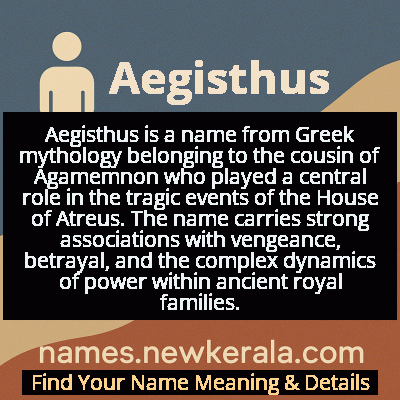Aegisthus Name Meaning & Details
Origin, Popularity, Numerology Analysis & Name Meaning of Aegisthus
Discover the origin, meaning, and cultural significance of the name AEGISTHUS. Delve into its historical roots and explore the lasting impact it has had on communities and traditions.
Name
Aegisthus
Gender
Male
Origin
Greek
Lucky Number
1
Meaning of the Name - Aegisthus
Aegisthus is a name from Greek mythology belonging to the cousin of Agamemnon who played a central role in the tragic events of the House of Atreus. The name carries strong associations with vengeance, betrayal, and the complex dynamics of power within ancient royal families.
Aegisthus - Complete Numerology Analysis
Your Numerology Number
Based on Pythagorean Numerology System
Ruling Planet
Sun
Positive Nature
Leaders, ambitious, highly driven, self-reliant, innovative.
Negative Traits
Overly aggressive, domineering, impatient, selfish.
Lucky Colours
Red, orange, gold.
Lucky Days
Sunday.
Lucky Stones
Ruby, garnet.
Harmony Numbers
2, 3, 9.
Best Suited Professions
Entrepreneurs, managers, engineers.
What People Like About You
Courage, determination, leadership.
Famous People Named Aegisthus
Aegisthus of Greek Myth
Mythological Figure
Central figure in the Oresteia who helped Clytemnestra murder Agamemnon and ruled Mycenae for seven years
Aegisthus (Literary Character)
Literary Figure
Prominent character in Aeschylus' Oresteia trilogy and Euripides' Electra, representing betrayal and vengeance
Aegisthus (Operatic Role)
Opera Character
Featured character in various operatic adaptations of the Electra and Iphigenia stories throughout operatic history
Name Variations & International Equivalents
Click on blue names to explore their detailed meanings. Gray names with will be available soon.
Cultural & Historical Significance
In classical Greek literature, particularly in the works of Aeschylus, Sophocles, and Euripides, Aegisthus serves as the archetypal usurper and adulterer. His most famous role comes in the Oresteia trilogy, where he conspires with Clytemnestra to murder her husband Agamemnon upon his return from the Trojan War. This act positions Aegisthus as a symbol of political treachery and moral corruption in ancient Greek thought. The character embodies the dangers of unchecked ambition and the consequences of violating sacred hospitality laws, as he kills a man who had returned to his own home. Throughout Greek drama, Aegisthus represents the corrupting influence of power and the destructive nature of revenge cycles.
Extended Personality Analysis
Individuals named Aegisthus are often perceived as possessing complex, ambitious personalities marked by strategic thinking and determination. Drawing from the mythological character, they may exhibit strong willpower and the ability to pursue long-term goals with remarkable persistence. However, these positive traits are often shadowed by tendencies toward manipulation and opportunism, as the original Aegisthus waited years to exact his revenge and seize power. This combination of patience and calculated action suggests someone who can bide their time while working steadily toward their objectives.
The darker aspects of the Aegisthus personality include potential for betrayal and moral ambiguity. The mythological figure's actions demonstrate a willingness to cross ethical boundaries to achieve personal or political goals. This might manifest in modern contexts as someone who prioritizes ambition over loyalty or who engages in complex power dynamics. Yet there's also an element of tragic destiny - Aegisthus was born into a cursed family and his actions were in many ways predetermined by his lineage. This suggests someone who may struggle with feelings of fatalism or who believes their path is already charted by circumstances beyond their control. The personality is ultimately one of contradiction - capable of both great patience and sudden, decisive action.
Modern Usage & Popularity
In contemporary times, the name Aegisthus remains extremely rare and is primarily used in academic, literary, or highly specialized contexts. It appears most frequently in classical studies departments, theatrical productions of Greek tragedies, and among parents with deep interests in mythology who seek distinctive names with historical weight. The name has never achieved mainstream popularity due to its strong association with the treacherous mythological character and the complexity of its pronunciation for modern speakers. Current usage trends show it appearing occasionally in Greece and among diaspora communities, but even there it remains uncommon compared to other mythological names like Achilles or Odysseus. The name's dark mythological baggage and its perception as overly dramatic limit its appeal for everyday use.
Symbolic & Spiritual Meanings
Aegisthus symbolizes the complex interplay between fate and free will, representing how ancestral curses and family legacies can shape individual destiny. His story serves as a powerful metaphor for the cyclical nature of violence and revenge, illustrating how unresolved conflicts perpetuate across generations. The character embodies the archetype of the usurper and the consequences of violating sacred social contracts, particularly the laws of hospitality and marital fidelity. Symbolically, Aegisthus represents the shadow self - the aspects of human nature that embrace ambition over ethics, and the psychological complexity of characters who operate in moral gray areas. His narrative functions as a cautionary tale about the corrupting influence of power and the dangerous allure of vengeance.

